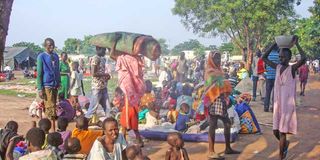Pressure mounts on S. Sudan to ratify Maputo Protocol as SGBV rises

Displaced South Sudanese in Juba.
What you need to know:
- The protocol details the rights of women by providing family units, communities and nation states with duties and responsibilities.
- Some provisions have specific actions to be undertaken to eliminate discrimination against women and guarantee right to dignity, right to life, access to justice, and equal protection.
South Sudan has been urged to ratify the African Charter on Human and Peoples' Rights on the Rights of Women in Africa, commonly known as Maputo Protocol.
A section of rights groups believe this will help free women and girls from sexual and gender-based violence (SGBV) as South Sudan is one of the countries with the highest prevalence in Africa.
The Centre for Peace and Advocacy (CPA), through its shadow report, recently raised the red flag, indicating women and girls in conflict zones continue to be abducted and sexually abused.
The rights groups, among them CPA, Equality Now, and Solidarity for African Women’s Rights (SOAWR), want the country to ratify the treaty to end the menace.
They want the country’s National Transitional Legislative Assembly to ratify the treaty to eliminate all forms of discrimination against women.
Accountability
Last week, the groups held training to advocate accountability on the country’s implementation of its obligations under the Committee on the Elimination of Discrimination against Women (CEDAW).
Ter Manyang Gatwech, CPA executive director, said CEDAW requires states to implement the treaties nationally. He added the CPA shadow report has recommended the CEDAW committee to ask South Sudan to “ensure unrestricted access by the UN, ceasefire monitors, and relevant humanitarian partners to all government and opposition cantonment sites and military bases where abducted civilians, including women and girls, might be held”.
The United Nations Commission on Human Rights last month released a report highlighting widespread sexual violence against women and girls in South Sudan conflict, fuelled by systematic impunity. It said widespread rape is being perpetrated by armed groups.
“It is outrageous and completely unacceptable that women’s bodies are systematically used on this scale as the spoils of war. Urgent and demonstrable action by authorities is long overdue, and South Sudanese men must stop regarding the female body as 'territory' to be owned, controlled and exploited,” said Yasmin Sooka, chair of the UN Commission.
The UN report is based on interviews conducted with victims and witnesses over several years. Survivors detailed shocking brutal and prolonged gang rapes perpetuated as their husbands, parents or children are forced to watch helplessly.
Women of all ages recounted being raped multiple times while other women were also being raped around them. As a result of the ordeals, victims often bear children and contract sexually transmitted infections, including HIV.
Deliberate attacks
The commission also found that the attacks were not random opportunistic incidents but involved armed soldiers actively hunting down women and girls during attacks on villages.
"It is scandalous that senior officials implicated in violence against women and girls, including cabinet ministers and governors, are not immediately removed from office and held accountable,” said Barney Afako, a member of the Commission.
Mr Afako added that to address the runway violence against women and girls, those in authority must promptly and publicly adopt a zero- tolerance policy.
The UN Commission, in the report, has called on the authorities in South Sudan to take the necessary steps to stop sexual violence against women and girls, by addressing impunity and the drivers of conflict and insecurity.
Half of all South Sudanese women are married off while under 18, and the country has the highest maternal mortality rate globally.
SGBV is also common outside of conflict, affecting women and girls in all segments of society.
Last year, a Pan-African organisation initiated a campaign to make the remaining 13 African Union member states to accede to the Maputo Protocol.
18 years later
SOAWR wrote an urgent petition to the 13 governments to ratify the protocol, which was specifically put in place by the African states to advance the human rights of African women and girls.
The organisation argued that 18 years after the protocol’s adoption by the African Union Commission, the 13 countries remain undecided, hence making women and girls under their jurisdiction at risk of not receiving protection.
The ground-breaking human rights treaty was adopted on July 11, 2003, at the second ordinary session of the AU Assembly in Maputo, Mozambique.
The consensus of the African leaders reaffirmed their commitment to protecting, promoting and fulfilling African women’s rights. The petition, dated November 25, 2021, was signed by 36 rights organisations that make up the SOAWR Coalition.
The countries yet to ratify the protocol include Botswana, Burundi, Central Africa Republic, Chad, Egypt, Eritrea, Madagascar, Morocco, Niger, Sahrawi Arab Democratic Republic, Somalia, South Sudan and Sudan.
The protocol details the rights of women by providing family units, communities and states with duties and responsibilities. Some provisions have specific actions that countries need to undertake to eliminate discrimination against women and guarantee right to dignity, right to life, access to justice, and equal protection.
The treaty, in addition, has articles that the right to participation in political and decision-making processes; the right to peace; and the right to protection in armed conflicts.





